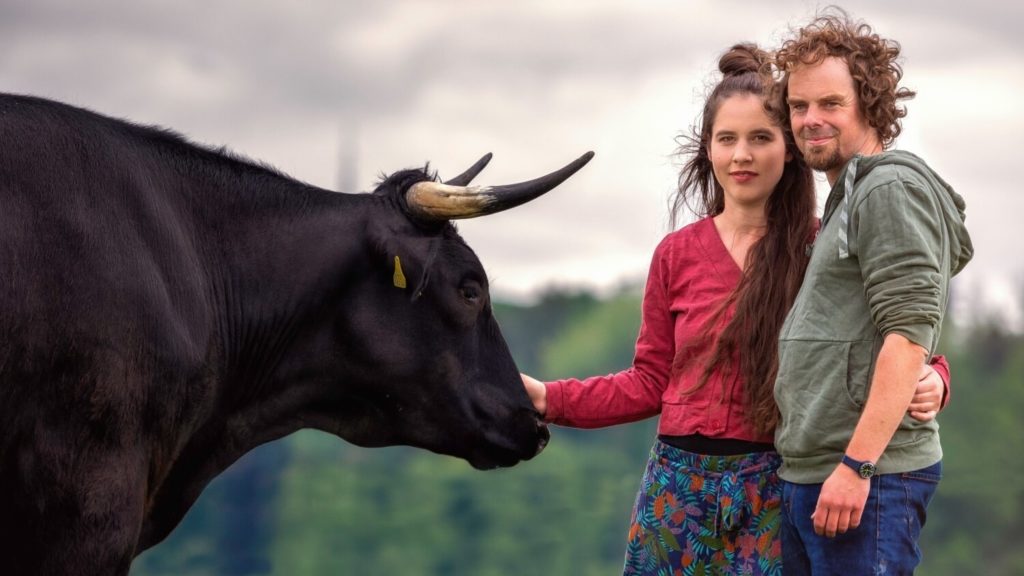Refarm’d is helping former dairy farmers to produce and deliver vegan oat milk.
The organization targets regions where farmers have shown an interest in transitioning away from traditional dairy.
Refarm’d then helps farms move into plant-based milk production with training and support.
During the transition, farm animals become sanctuary animals and continue to live within their family groups in a familiar location. Refarm’d CEO Geraldine Starke says she always wanted to find a new, scalable model for sanctuaries that also directly impacts animal agriculture.
After nearly a decade of veganism and entrepreneurship, Starke came up with the concept for Refarm’d.
“I realized two years ago that meat and dairy farms are the perfect places [to] become sanctuaries,” she told LIVEKINDLY. “They already have the animals, the land & structures as well as the people who know how to care for them on a daily basis.”
“Farms becoming sanctuaries avoids the need to dispatch animals in multiple sanctuaries and often separating herds,” continued Starke. “[It avoids] the need to use more resources like getting new land and is a transition that can, therefore, be quick.”
“Most importantly, it has a direct impact on animal exploitation because each farm that shifts into a sanctuary is one farm less bringing new lives into this world,” she added.

Vegan Milk
Producing vegan milk provides the framework and income needed for farmers to transition away from dairy.
It enables them to continue supporting the animals, the farm, and themselves, all without animal exploitation. Starke says she first aims to “transition all small and medium scale sized farms in the world.” After that, she is aiming to build a functioning model for large scale and factory farms.
“At the same time I would like for farmers to be part of this change of the food system,” she added. “And allow them to maintain the traditions, remain custodians of the land, continuing to produce a fresh product but with a twist, a twist that implies animals are not used anymore.”
Initially, Refarm’d handles the logistics of the transformation. It provides free equipment and training and sources local and organic ingredients to produce plant milk. Refarm’d also organizes pick up locations and advertises the transcription service through its platform.
“We want to make it easy, risk, and investment free to them so that they want to make the change. We work with a 3 months trial period that allows them to test our model before committing long term,” Starke explained. “Farmers are under contract and animals legally protected.”
“Developing the local community [and] producing fresh quality foods is very important to me,” she said. “It’s important to show that the new plant-based world we are heading towards is not only made of lab-grown meat but also on handmade and quality food.”

Declining Dairy
A number of factors have caused a reduction in the demand for dairy. The industry has become part of the global trade, leading to falling prices and increased demands on individual farmers. Mega-dairies and factory farms are increasingly commonplace and many smallholders find themselves unable to compete.
Milk consumption has also been on a steady decline for decades. Generational differences are one factor in this, along with the growing popularity of dairy-free alternatives. The COVID-19 pandemic has also impacted both production and distribution, causing some farms to pour away gallons of milk.
As the industry continues to struggle, many larger companies have already adapted to the changing marketplace. While some small companies and family businesses may struggle to do this without support. Notably, Refarm’d exclusively works with farmers who have reached out to the organization themselves for assistance.
“We don’t reach out directly to farmers as we believe there is no point in trying to convince farmers who are happy about what they are doing. We focus on those who ask for our help,” said Starke. “And there are many.”
“Clearly, all farmers that are reaching out to us have had some sort of change happening to them that makes them see the animals differently, and push them to look for ways out of exploitation. Environmental consideration is also something that often comes up with farmers and where they want to act on,” she added.
According to Refarm’d, approximately 70 billion farmed animals are reared every year around the world. More than 6 million are killed for food every single hour. The beef and dairy industries, in particular, are leading causes of climate change. One gallon of milk requires 1000 gallons of water.

Ditching Meat
Refarm’d isn’t alone in supporting a transition away from animal agriculture.
Animal rights organization People for the Ethical Treatment of Animals (PETA) recently said it will pay for meatpackers to retrain as florists or to produce vegan meat.
Mercy For Animals’ Transfarmation Project also helps farm-owners move away from animal husbandry. In West Virginia, former chicken-farmer Mike Weaver is using his old chicken barns to grow industrial hemp. The plant removes more CO2 per acre than many other similar crops.


